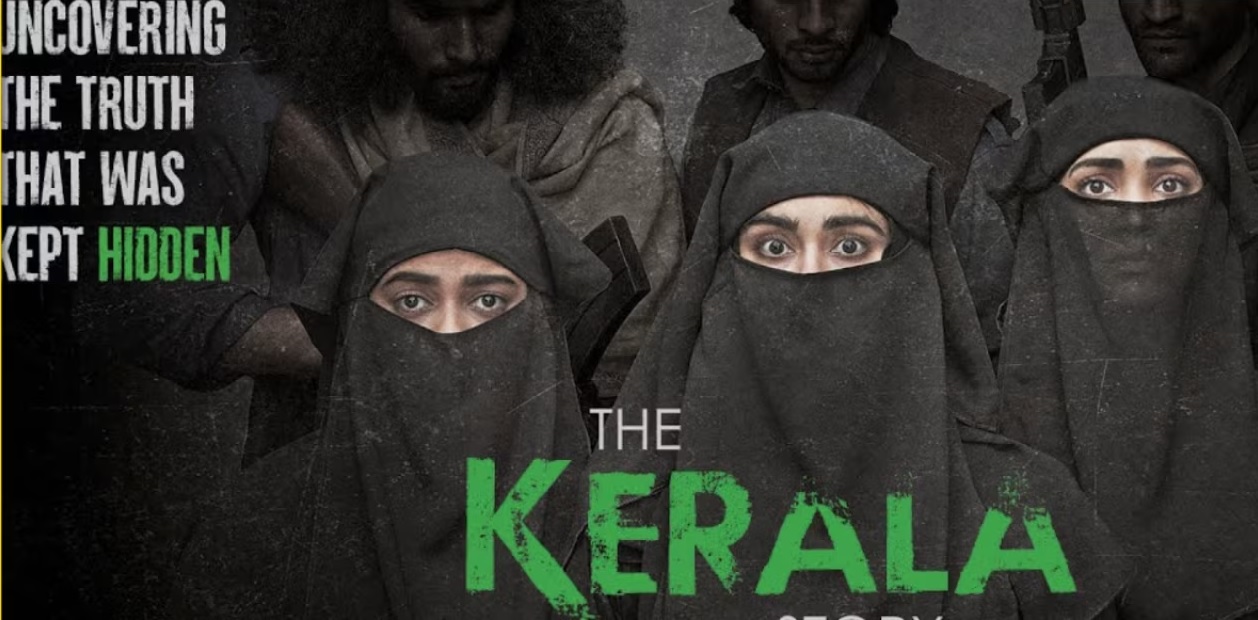Published Aug 03, 2025 | 9:00 AM ⚊ Updated Aug 03, 2025 | 9:00 AM

The movie sparked widespread protests in Kerala and a few other states for its alleged fake narrative.
Synopsis: The 71st National Film Awards jury’s decision to honour The Kerala Story for its direction and cinematography has drawn sharp criticism from Kerala. The argument: The movie allegedly promoted lies and half-truths about Kerala, much to the glee of a political ideology that spreads hatred and divisive thoughts in a secular society. It was not the real Kerala’s story.
When an award, meant to celebrate unity, ends up honouring division, one can’t help but wonder: What exactly are we funding with our taxes?
Five lakhs of taxpayers’ money down the drain to reward what many call nothing more than a cinematic hate pamphlet.
That’s the sum the 71st National Film Awards has handed over to The Kerala Story, a film mired in controversy for peddling communal propaganda under the guise of storytelling.
The National Film Awards—promoted by the NFDC under the Ministry of Information and Broadcasting—were instituted to recognise cinematic works that blend artistic merit with social relevance, and above all, uphold the unity and integrity of the nation.
Yet, in a bewildering move, The Kerala Story has bagged two major honours—Best Direction and Best Cinematography—netting a cool ₹3 lakh and ₹2 lakh, respectively, as prize money.
This, despite the film’s track record of vilifying an entire state and stoking Islamophobic fears by portraying Kerala as a terror recruitment hub.
For many, this isn’t recognition—it’s a reward for propaganda.
The awards have not only stunned cinephiles but also reignited outrage across Kerala and beyond, where the film was earlier slammed for distorting facts, maligning the Muslim community, and painting the state in a grotesque, divisive light.
Much like The Kashmir Files by Vivek Agnihotri, The Kerala Story of Sudipto Sen, which claimed to be the result of years of research, hit theatres in May 2023 — only to stir controversy for allegedly fuelling hate and spreading half-truths.

Adah Sharma in a still from ‘The Kerala Story’. (Twitter)
The film follows the journey of three non-Muslim nursing students from Kerala who are brainwashed into abandoning their faith and recruited by an extremist outfit linked to the Islamic State.
Though promoted as a portrayal of real events, the film’s conclusion provoked strong reactions and drew widespread criticism for its perceived communal messaging.
Despite this, the feature film jury at the National Film Awards defended its selection.
Jury Chairperson Ashutosh Gowariker explained that the Best Cinematography award was given for the film’s “pure and realistic visuals” that effectively conveyed the director’s vision and the “stark reality” it aimed to depict.
The film also won Best Director, with Gowariker stating that the jury unanimously appreciated the way a “difficult subject” was handled with “sincerity” and “authenticity,” believing it reflected what might have “actually happened.”
Addressing concerns that the film is widely seen as propaganda targeting a particular community and state, Gowariker responded, “That’s a point of view you had — we at the jury didn’t feel so. We unanimously agreed on the award, considering the film’s sociopolitical context.”
The film quickly became a favourite of the BJP, emerging as a potent political symbol amid rising communal rhetoric.

A still from the Kerala Story (Twitter/Taran Adarsh)
Marketed as a “true story,” the film initially claimed that 32,000 women from Kerala had been converted to Islam and recruited into ISIS—a figure later inflated to 50,000 in promotional content, despite lacking any empirical evidence.
Its release on 5 May 2023, during the heat of the Karnataka Assembly elections, gave it immediate political traction.
Prime Minister Narendra Modi seized on the film’s release, referring to it during a campaign speech in Ballari on the day it hit theatres. He lauded the movie for exposing alleged terror plots in Kerala and accused the Congress of siding with “terror elements” by criticising it.
Modi framed the film as a warning about a new, internal form of terrorism corroding Indian society. Other BJP leaders followed suit.
Party president JP Nadda attended a screening in Bengaluru on 7 May and praised the film for addressing “a new kind of terrorism,” insisting its message transcended geography and religion.
Uttar Pradesh Chief Minister Yogi Adityanath also watched the film with his Cabinet, congratulating the makers and declaring it tax-free in his state. Several other BJP-ruled states—including Madhya Pradesh, Haryana, and Uttarakhand—followed suit.
The Rashtriya Swayamsevak Sangh (RSS) echoed these endorsements, with its mouthpiece Organiser describing the film as revealing an uncomfortable but “dangerous truth.”
The Kerala Story became more than a movie—it evolved into a political weapon in the BJP’s ideological and electoral campaigns.
Upon its release in 2023, The Kerala Story ignited a political and social firestorm in Kerala, with both the ruling CPI(M) and the opposition Congress strongly opposing the film’s narrative.
The film controversially claimed that 32,000 women from Kerala were converted to Islam and radicalized into joining terror outfits like ISIS—claims widely debunked and criticized as gross exaggerations.
Chief Minister Pinarayi Vijayan called it a “propaganda piece” aimed at communal polarisation, accusing it of tarnishing Kerala’s secular fabric.
Cultural Affairs Minister Saji Cheriyan described the film as venomous hate propaganda and hinted at possible legal action. The CPI(M) maintained that the film was aligned with the Sangh Parivar’s agenda to divide society. The Congress echoed similar concerns.
Opposition Leader VD Satheesan demanded a ban, calling the film’s narrative divisive and misleading.
However, Shashi Tharoor MP, while opposing the storyline, stopped short of calling for a ban, instead urging Keralites to reject what he described as a distorted portrayal of the state. He also said, “It may be your Kerala story. It is not our Kerala story.”
The controversy resurfaced in 2024 when Doordarshan decided to telecast the film ahead of the Lok Sabha elections. CPI(M) state secretary MV Govindan complained to the Election Commission, warning that the timing could influence voters and disrupt communal harmony.
Meanwhile, the Syro-Malabar Church’s Idukki diocese screened the film for high school catechism students, framing it as a lesson on the dangers of “love jihad.”
The move drew criticism, forcing the Thalassery diocese to cancel similar plans.
The National Award for The Kerala Story on 1 August has reignited the political and cultural firestorm in Kerala, with Chief Minister Vijayan and Opposition Leader Satheesan condemning the decision.
On 1 August, Vijayan slammed the jury for its “communal bias,” accusing it of rewarding a film built on “lies” and designed to defame Kerala and spread communal hatred.
He alleged the jury had succumbed to the Sangh Parivar’s agenda of weaponising cinema, thereby insulting the legacy of Indian cinema, which traditionally upheld national integration and religious harmony.
Satheesan echoed a similar sentiment, denouncing the Union government for politicising the National Film Awards. He called the selection of The Kerala Story part of a larger hate campaign aimed at sowing religious animosity, saying it was “unacceptable” and an “attempt to defame the state for political mileage.”
Vijayan continued his critique on 2 August at the Kerala Film Policy Conclave, asserting that the award glorified a film that distorted Kerala’s secular tradition and misrepresented the state on a global platform.
“This is not recognition of art,” he said, “but a dangerous endorsement of communal propaganda.”
The chief minister urged the cultural and film community of Kerala to resist such distortions, emphasizing that Malayalam cinema earned its stature by staying rooted in humanism, truth, and secular values.
“The foundation of our cinema is under attack,” he warned, calling for collective resistance against divisive portrayals that threaten Kerala’s cultural fabric.
The state, through its protests, said that in awarding The Kerala Story, the Union Government hasn’t just backed a film—it has endorsed a narrative that divides.
What was meant to honour creative excellence now risks becoming a badge of political propaganda. It is being stated that this isn’t a celebration of cinema; it’s state-sponsored storytelling with a sinister script.
(Edited by Majnu Babu).

